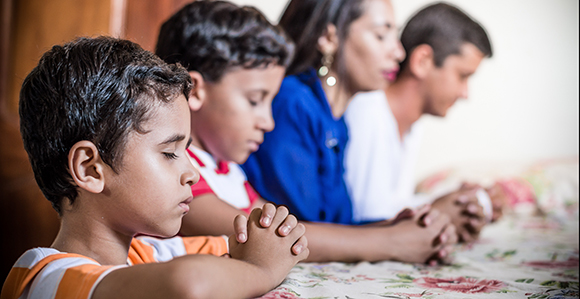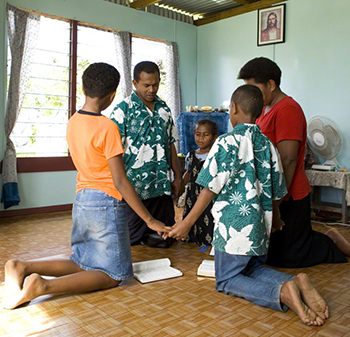BYU Research Shows Why Your Family Should Pray Together
Contributed By Marianne Holman Prescott, Church News staff writer

Whether praying before a meal, at bedtime, in stressful situations, or on holidays or special occasions, researchers found prayer has many positive benefits.
Article Highlights
- Researchers studied how family prayer influences family relationships.
- Among the positive outcomes were reduced relational tensions and feelings of closeness and unity.
A decade ago, Joe Chelladurai and his father were standing on the coast near his hometown of Chennai, India. The two talked as they watched the rising rays of the early morning sun and listened to the rolling waves.
Chelladurai, then in his late teens, was feeling overwhelmed. Besides struggling in school, he had other things on his mind.
His father prayed with his son.
“I remember him expressing love and concern in his prayer,” said Chelladurai.
Chelladurai was used to praying with his family, but the words of his father’s special prayer left him feeling strengthened. It was a pivotal moment moving forward.
Just a few years later in 2016, after serving a mission and completing his undergraduate and masters degree at a college in India, Chelladurai was in his first semester of his PhD program at Brigham Young University when he was invited to his roommate’s family dinner over the Thanksgiving holiday.
Before the meal, the family gathered together for a prayer.
“I observed a family coming together naturally,” he said. “It was special for them; they spoke of things they were grateful for and were getting emotional.”
That experience, coupled with those of his own growing up, sparked his interest in studying more about how prayer impacts families.
Rather than wondering if prayer made a difference in families, Chelladurai wanted to know how it made a difference.
“We wanted to get into the specifics,” he said.
In a recently published study in the Journal of Psychology, BYU researchers looked at Chelladurai’s question—how family prayer influences family relationships. What Chelladurai and his colleagues found is that the familiar phrase “The family that prays together stays together” is more than just a saying.
And now there’s research to back it up.

New BYU research finds that praying together as a family has many positive benefits, including reducing relational tensions and increasing feelings of closeness and unity.
“There hasn’t been much research that actually looks carefully at what does happen with families that pray together,” said David C. Dollahite, professor at Brigham Young University and one of the authors of the paper. “If it is true that ‘the family that prays together stays together’—why? And what is it about prayer that affects relationships that helps families be closer and have greater unity?”
Researchers studied 476 participants from 198 religious families—Christian, Jewish, and Muslim—living in 17 different states across the country and asked questions like:
- “Which faith practices hold special meaning to you as a family?”
- “How do you share your faith with your children?”
- “How does your family overcome stresses and problems?”
The questions didn’t specifically ask about prayer, but many participants reported that prayer was important and meaningful to them and “occupied a special place in family life.”

New BYU research finds that praying together as a family has many positive benefits, including reducing relational tensions and increasing feelings of closeness and unity.
In fact, 96 percent of the families referred to prayer in their responses.
Whether praying before a meal, at bedtime, in stressful situations, or on holidays or special occasions, researchers found prayer has many positive benefits. Among the positive outcomes were reduced relational tensions and feelings of closeness and unity.
The study authors—Chelladurai, Dollahite, and Loren D. Marks, all from the School of Family Life at BYU—identified seven themes from their research:
Theme 1: Family prayer as a time of family togetherness and interaction
Participants indicated that family prayer was a time of worship, as well as a time of interaction. As they removed distractions and set aside time to disconnect from the rest of the world, they were able to connect with God and each other.
“These intentional efforts to prioritize and be available reportedly makes this a special time of family togetherness that stands out from the rest of the day,” according to the publication.
Yameen, a Muslim father quoted in the study reported, “We [pray] as a family. Especially after prayer … the whole house settle[s] down. There is no TV, there is no internet … there is pureness of communication there, and it comes straight from the heart. You know, you just cannot get that any other way and especially close with the children.”
Gabriella, a Jewish mother, said, “It is a chance to breath, to relax. … We’ve had a busy week and here’s our time to be together, and we always take a deep breath before we do this and let all the thoughts, craziness, and worries, and everything slip away, and we say the blessing.”

New BYU research finds that praying together as a family has many positive benefits, including reducing relational tensions and increasing feelings of closeness and unity.
Theme 2: Family prayer as a space for social support
Researchers reported that families in the study identify prayer as a place for them to “go to God” to “draw strength” and “comfort and encourage each other.” Prayer can also be a time for families to share and process personal challenges. It is a powerful arena for providing and receiving social support.
One Asian Christian mother, Mei-Fen, said of her experience praying with her son: “There were several times this year, he said he felt bad when he came back home from school. He wanted me to pray with him hand in hand in his room, and then he felt better and went to sleep. Prayer has become his practice. … It seems that he found answer[s] through prayer.”
Theme 3: Family prayer as a means for intergenerational transmission of religion
Family prayer is one way to develop a “sense of ritual” as parents teach their children about religion and faith. As children learn to pray through their parents’ example, a flow of religious direction and communication occurs.
“Family prayer, as a practice, was also a means to transmit faith,” according to the study.
Khadija, an 18-year-old Muslim, said of her younger sister: “Even the youngest one, she likes to pray. She’s one and a half. She’ll come and she’ll try new positions with us. She doesn’t understand exactly what we’re doing, but she sees us doing it every day. And that’s part of her everyday life, so she’ll come and she’ll join us, and she’ll look at us, see if she’s doing it right. And from an early age it becomes part of your life, so when you’re older and you have to do it, then it becomes just easy for you, and it’s not a burden.”
Theme 4: Family prayer involves issues and concerns of individuals and the family
Not only is prayer an opportunity to speak to God, it is also a time for families to disclose details of their day. Whether it is addressing a concern or an opportunity to pray on behalf of others, prayer becomes a “time and space” to share feelings and thoughts.
Theme 5: Family prayer helps reduce relational tensions
Researchers found that for participants praying together as a family brought a “balancing” effect to their relationships.
“Family members reported that during times of relational tensions and stress, prayer was a way to reduce or even alleviate tensions, as well as to help maintain harmonious relationships,” the study says.
Theme 6: Family prayer provides feelings of connectedness, unity, and bonding
Another benefit of family prayer is a sense of connection within a family unit. The physical and spiritual aspects of family prayer—holding hands and coming together as a family “praying as one”—bring a spiritual connection, unity, and bonding.
“Families that seemed to have [prayer] naturally … [part] of their day, those who were intentional, seemed to have seamless connections that helped in many aspects of family life,” said Dollahite. “It is a time for them to connect with God and each other.”
Theme 7: Families struggle to pray together when there is disunity
Just as there are many positive experiences that come from family prayer, there are some challenges and struggles associated with praying as a family. When one or more family members are “nonbelievers” or practice a different faith, prayer can be a divide, bring dissatisfaction and conflict.
Even families practicing the same religion with similar core beliefs can see conflict when one of the family members feels there should be more or less prayer in their home.
For those families who struggle to pray together, Chelladurai said to start with the daily rituals of praying before a meal or before children go to bed.
“Family prayer doesn’t have to take too long,” he said. “As families do this frequently, prayer can be a place for families to focus on the opportunity to be together, to express love and support, and a place people can turn for strength.”
Dollahite added, “We need to be thoughtful, intentional, and mindful how we do prayer in the fabric of our life.”
The article can be found online or accessed through most libraries.
